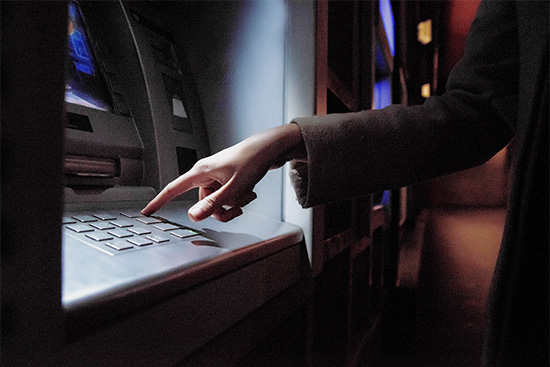BUPD Warns against Common Scams
If it sounds sketchy…it probably is

BUPD Chief Kelly Nee says students needs to be careful when they’re approached at an ATM or any time they have their wallet out. Photo by ljubaphoto/iStock
He can laugh about it now, but it remains a cautionary tale.
When Kevin Leonardo was a freshman, he and a couple of friends were heading back to Warren Towers after a long night in the library. They stopped at a nearby ATM on their way to City Convenience, and a stranger in his early 20s talked his way in the door. He held a check for $1,000 and asked Leonardo to cash it for him, because he had no ATM card, he said. What he did have was a hazy sob story about having to go to the airport the next day. It sounded sketchy, but Leonardo is a nice guy, and willing to help.
“I think it was a mix of insecurity and the freshman adjustment,” Leonardo (COM’20) says with a chuckle. “I am very different now.”
Fortunately for him, the ATM wouldn’t spit out the cash without his approval of an overdraft fee. Leonardo hesitated and his friends started arguing with the guy, and one of them spotted a wad of cash in his pocket. The man left the ATM and ran down the street.
Kelly Nee, chief of the Boston University Police Department, says the con is a classic, one that students should be especially wary of when they’re approached at an ATM or any other time they have their wallet out. “It might sound like a great sob story,” she says, “but be very, very careful, because it could be a scam.”
The details of the pitch vary, but the basic formula remains the same, often with a little extra incentive. Could you cash this check for me? It’s for $350. I really need it—just give me $300 and you can keep $50 for your trouble. The check, of course, is bogus, but the scammer is long gone by the time the student finds out.
“Once the student counts out that money, it’s gone,” says Nee. “The banks don’t have to reimburse you, because you knowingly cashed it. It’s just a pure scam, preying on their goodwill.”
BUPD Detective Lieutenant Peter DiDomenica says between January and March seven students reported being hit by the scam. It’s occurred all around campus, from Warren Towers to 949 Comm Ave and from Kenmore Square to 1024 Beacon St.
“It happens all over the country,” Nee says, “but new students are particularly vulnerable because they’re benevolent—they don’t know who the players are.”
A second, more elaborate version of the scam has baited students checking out online job boards, including the BU Student Job Service. Those students found themselves “hired” for work-at-home online jobs. They received a paycheck in advance, usually from $2,000 to $6,000, but then got a message telling them the amount was wrong, and could they please send back the overpayment? The check, of course, is worthless, but trusting victims have been known to send hundreds of dollars to the scammer.
Last year, BUPD had about 45 reported fraud crimes, 13 of them check-based fraud.
Both scams may take advantage of one particular blind spot of today’s students, Nee says, shaking her head: “Checks? Everything is done electronically now. This generation never sees a check.”
Find other safety tips here.
Comments & Discussion
Boston University moderates comments to facilitate an informed, substantive, civil conversation. Abusive, profane, self-promotional, misleading, incoherent or off-topic comments will be rejected. Moderators are staffed during regular business hours (EST) and can only accept comments written in English. Statistics or facts must include a citation or a link to the citation.